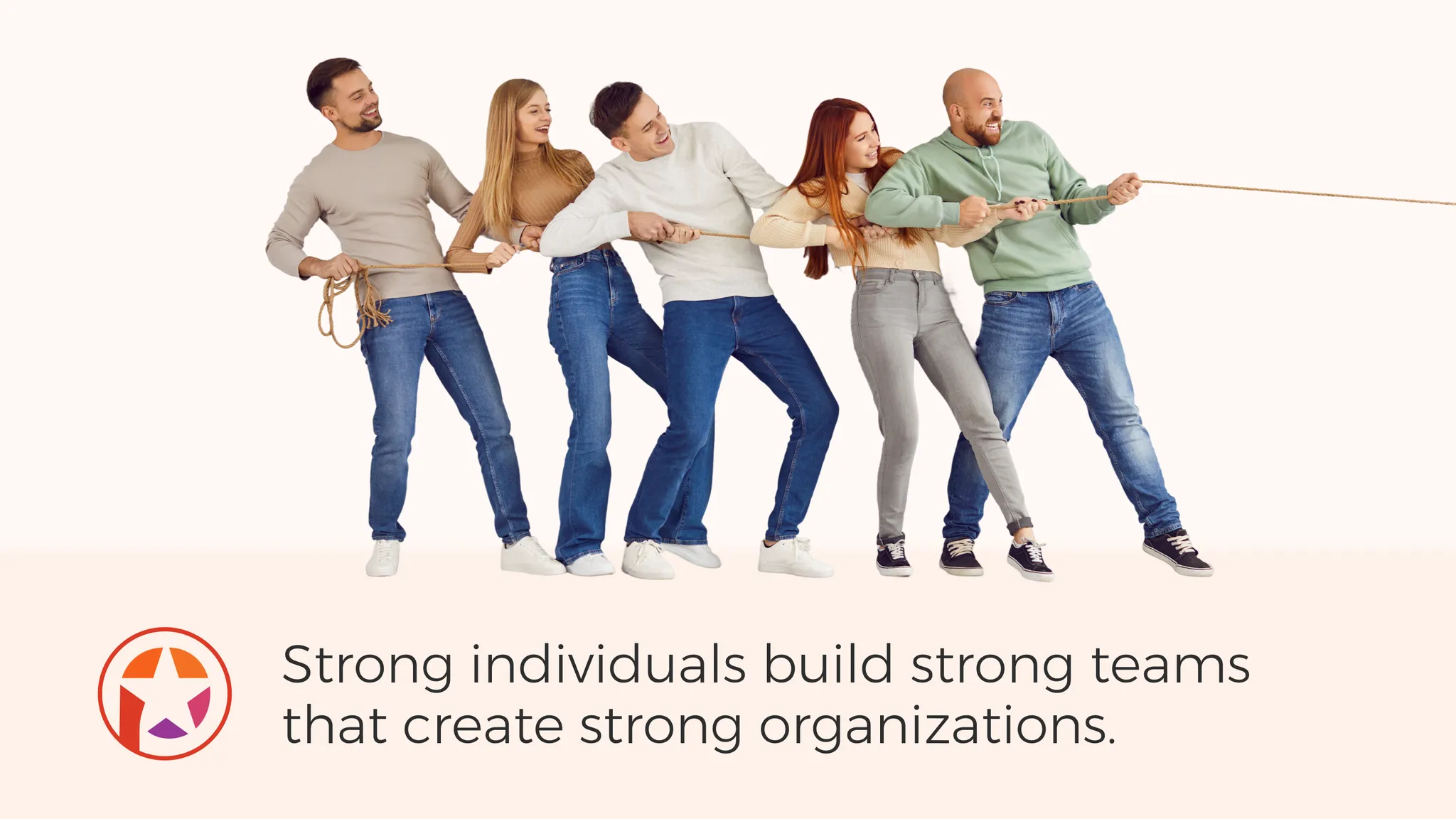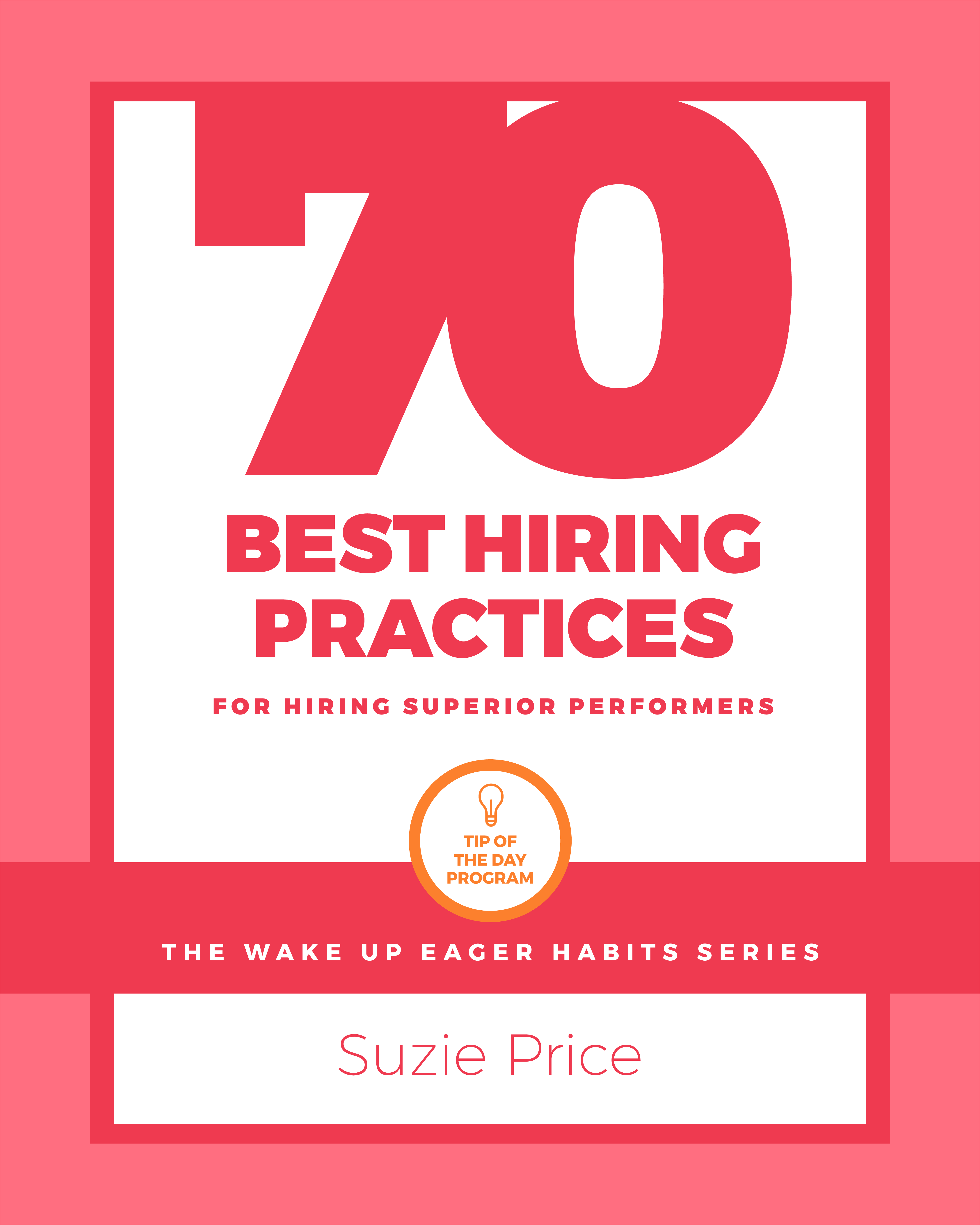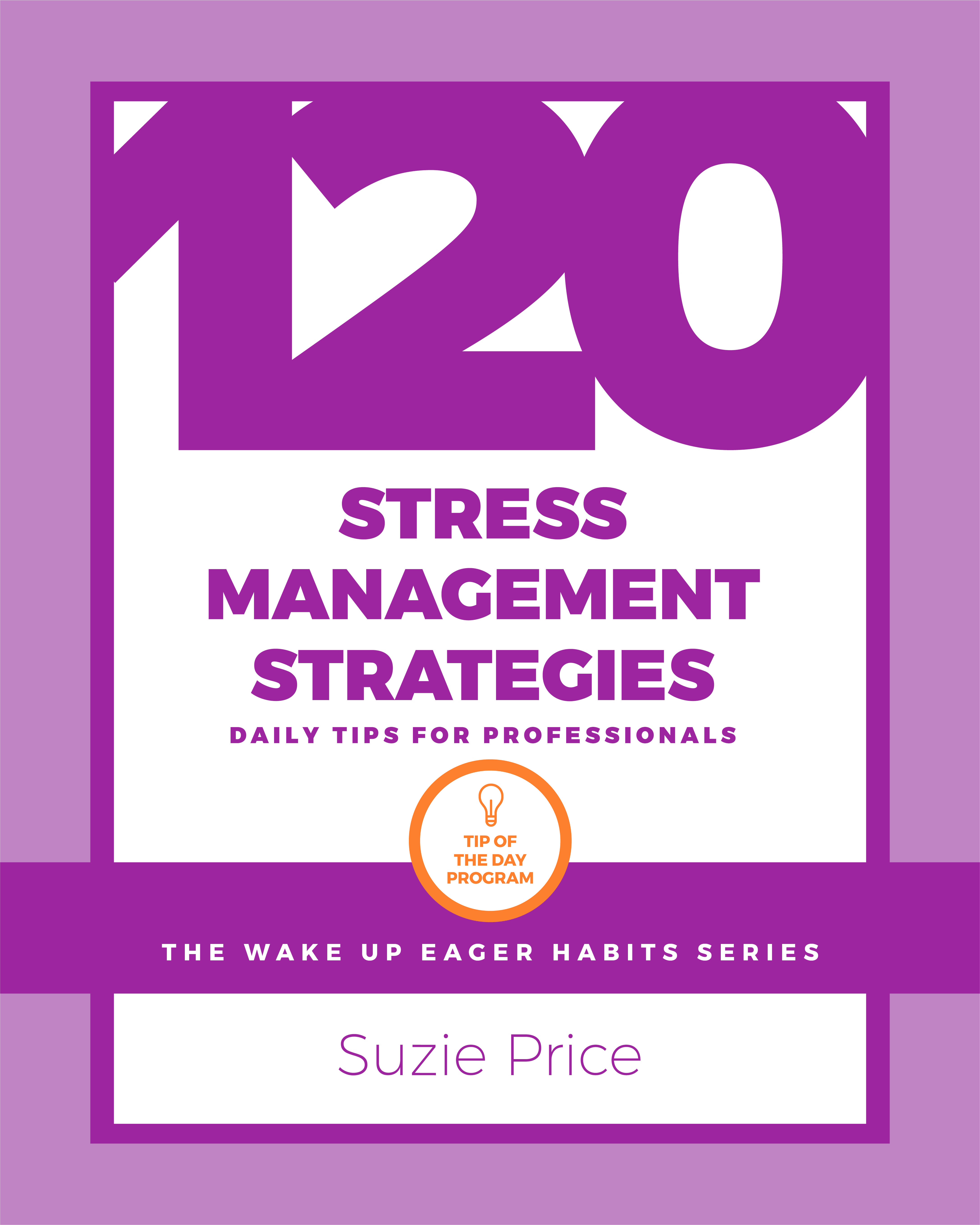The Know How You Need & the Tools to Get You There... Get Certified >

Mini-Episode 8#: 19 Important Reasons Why Your Strengths Matter

In this energizing mini-episode, we explore the transformative science behind strengths—backed by research and real-world insight. Drawing from Gallup studies and decades of workplace data, our hosts unpack why using your natural talents daily isn’t just a productivity hack—it’s a proven path to deeper happiness, engagement, and impact.
Through a blend of science, storytelling, and strategy, this episode invites listeners to see strengths not just as skills, but as their most authentic expressions. You’ll hear how leveraging what energizes you can boost performance, reduce stress, and spark a ripple effect of well-being in teams and communities.
Whether you're a leader, manager, or growth-minded individual, this conversation offers 19 compelling reasons to name, claim, and aim your strengths every day—and start building a Wake Up Eager life, one aligned choice at a time.
Key Takeaways from Mini-Episode #8 ---
- Strengths Fuel Fulfillment – Using your natural strengths daily boosts happiness, energy, and well-being, both personally and professionally.
- Engagement Starts with Strengths – Employees who focus on their strengths are six times more likely to be engaged and productive at work.
- Flow Follows Authenticity – Strengths align with activities that feel natural, making it easier to experience flow and timeless focus.
- Awareness Drives Growth – Simply knowing your strengths can spark personal development, better decisions, and goal-oriented behavior.
- Strengths Create Ripple Effects – Energized individuals positively influence their teams, families, and communities through their authentic presence.
- Fix Less, Amplify More – Rather than focusing on weaknesses, doubling down on strengths unlocks greater success and satisfaction.
- Strengths Empower Leaders – Managers who focus on their team’s strengths are 86% more successful and make better personnel decisions.
- Reflection Reveals Patterns – Journaling about what energizes you helps clarify your unique strengths and builds confidence over time.
- Purpose Is Personal Power – Identifying and using strengths gives individuals a sense of direction, agency, and lasting fulfillment.
Episode Transcript:
[00:00:00] Suzie Price: welcome to this wake up egear workforce podcast many episode where we share in 10 minutes or less our monthly article from LinkedIn in a new audio format courtesy of our AI co host as they walk through the article and share additional insights exclusively for you I am Suzie Price I'm your podcast host and the founder of Priceless Professional Development and whether you're listening to one of our long form episodes or something like this mini episode our focus is always to provide everything to you related to helping employees in your organization build a high commitment low drama wake up eager workforce we're focused on creating great hiring creating great teams helping leaders and individuals wake up eager you can find all of our episodes long form and short form at Wake Up Eagle workforce.com and you can subscribe anywhere that you get your podcasts so let me know if you have any questions if you are enjoying these mini episodes or any of our other episodes or if I can help you in any way you can find me at Susie at priceless professional. com Suzie Price on LinkedIn and of course our contact information if you go to wake up eager workforce.com thanks for tuning in appreciate you very much and go out and have a wake up eager kind of day take care
[00:01:23] AI 1 : welcome to the Deep Dive so you sent us this really interesting article all about focusing on strengths and why that well why it matters today we're gonna dig into that source
[00:01:35] AI 2 : that's right and our mission really is to unpack it go beyond just a summary we want to get at the core ideas understand the case it's making for why you know using your natural strengths is supposed to be so
[00:01:47] AI 1 : critical critical for well being success all of that exactly
[00:01:51] AI 2 : according to the research they cite yeah for personal happiness and professional stuff
[00:01:55] AI 1 : okay let's get into it then the article starts by defining strengths but maybe not how everyone thinks about them it's not just skills right
[00:02:03] AI 2 : right exactly the source is quite specific strengths here are um more than just things you've Learned it talks about preferences innate characteristics like natural inclinations yeah the stuff that feels authentic your unique wiring essentially
[00:02:15] AI 1 : ah okay so less about Learned competence more about what feels natural what gives you energy what's really you you got it
[00:02:23] AI 2 : it's where talent meets enjoyment basically and the core idea the main premise this article puts forward it's pretty bold actually oh yeah what is it it says knowing and crucially using these strengths daily is essential like fundamental for consistent happiness motivation
[00:02:41] AI 1 : and for creating what it calls a wake up eager life
[00:02:44] AI 2 : I saw that phrase that's the one wake up eager definitely has appeal doesn't it the opposite of that Sunday night feeling
[00:02:50] AI 1 : no definitely so it makes this big claim does it back it up
[00:02:53] AI 2 : it does and this is where it gets really interesting it doesn't just assert this it lays out well the outline you saw mentioned 19 specific reasons 19 wow yeah citing research studies Gallup comes up quite a bit yeah it presents a lot of evidence for why this daily focus makes such a difference
[00:03:09] AI 1 : okay 19 reasons that's a solid case they're trying to build where does it start what's the first area of impact
[00:03:14] AI 2 : it starts inwards looking at the impact on you personally your well being the research cited suggest when you use your strengths every day you're way more likely to feel energized well rested happy even energized and well rested
[00:03:28] AI 1 : that alone sounds good
[00:03:29] AI 2 : and also more likely to feel respected and proud so it hits on a few different levels
[00:03:35] AI 1 : so physical energy emotional state self perception too
[00:03:39] AI 2 : covers a lot of ground yeah and it also connects using strengths to experiencing flow you know that state
[00:03:47] AI 1 : oh yeah where you just get lost in something
[00:03:49] AI 2 : time disappears exactly that absorbed challenge maybe but engaged and you feel this sense of accomplishment being in your element
[00:03:57] AI 1 : flow is definitely something people chase after so strengths help you find that more often
[00:04:01] AI 2 : according to this source yes yeah and some of the data points are quite striking like individuals using their strengths daily they're reported to be three times more likely to say they have an excellent quality of life
[00:04:11] AI 1 : three times just from using strength daily that's that's huge
[00:04:15] AI 2 : it really is it kind of elevates the whole idea doesn't it it's not just being good at stuff right it sounds more fundamental yeah the article really emphasizes that tapping into these natural talents increases well being energy levels and specifically for adults at work using strengths is linked to less stress less stress at work and more energy by the end of the day which you know feels like the opposite of what often happens
[00:04:38] AI 1 : totally less stress more energy sounds like the dream combo against burnout
[00:04:42] AI 2 : the source definitely frames it that way and it mentioned something else interesting a kind of ripple effect
[00:04:47] AI 1 : ripple effect how so
[00:04:49] AI 2 : well when people are happy and energized because they're using their strengths that positivity tends to spread
[00:04:55] AI 1 : ah okay like your good mood affects others
[00:04:58] AI 2 : yeah colleagues friends family your own well being can actually contribute to theirs
[00:05:04] AI 1 : that makes sense positive energy can be infectious okay so big personal impacts how does this translate to the workplace for organization
[00:05:11] AI 2 : right this is where the uh the business case really comes through the article states people focusing on strengths are 6 times more likely to be engaged at work
[00:05:20] AI 1 : six times more engaged that's a massive statistic for any company what does that engagement lead to
[00:05:26] AI 2 : well concrete results the article points to research suggesting that just learning about your strengths just knowing them can make employees about 7.8% more productive
[00:05:37] AI 1 : wait hold on just knowing them makes you nearly 8% more productive not even necessarily using them differently yet
[00:05:43] AI 2 : seems like it the awareness itself is presented as a catalyst
[00:05:47] AI 1 : huh that's surprising
[00:05:48] AI 2 : it is and the source argues that when employees are consistently doing what they do best you see higher engagement higher productivity and crucially better retention rates
[00:05:58] AI 1 : better retention that's always huge for companies
[00:06:01] AI 2 : absolutely the article explicitly connects this to financial benefits for the organization people do better work and they stick around longer it's a clear win win
[00:06:09] AI 1 : okay clear benefits there what about managers does the article talk about their role in this
[00:06:14] AI 2 : oh definitely it highlights leadership as critical get this managers who actively focus on employee strengths are reportedly 86% more successful than those who don't
[00:06:24] AI 1 : 86% that's wow that's incredibly high why such a big difference
[00:06:29] AI 2 : well a few things are suggested 1 managers who understand their own strengths are perhaps unsurprisingly better at spotting and nurturing strengths in their team
[00:06:38] AI 1 : okay that makes sense self awareness helps you see it in others
[00:06:41] AI 2 : right and the article also notes that top managers according to the research it uses tend to reward based on strengths and contributions not just seniority
[00:06:49] AI 1 : ah shifting from tenure to talent
[00:06:52] AI 2 : exactly which leads to better decisions about who does what it kind of flips the traditional script
[00:06:57] AI 1 : interesting so better personal decisions essentially yeah
[00:07:00] AI 2 : and it even gets specific mentioning things like strengths based feedback sessions boosting sales performance significantly very tangible outcomes
[00:07:09] AI 1 : got it OK so personal well being workplace performance what about like longer term personal growth
[00:07:15] AI 2 : finding your purpose yeah the article connects strengths to purpose too it frames using your natural talents as sharing your unique gifts with the world
[00:07:23] AI 1 : so contribution using what you're naturally good at to make an impact
[00:07:27] AI 2 : exactly a sense of purpose and it also links knowing your strengths to feeling more in control of your future
[00:07:32] AI 1 : how so
[00:07:34] AI 2 : well if you understand what energizes you where you excel naturally you can make better choices right about your career projects even hobbies you steer towards things where you're likely to thrive
[00:07:46] AI 1 : gives you more agency maybe more control over your path
[00:07:49] AI 2 : precisely and the article argues that actively developing your strengths getting even better at what you're already good at fosters a growth mindset it encourages setting goals you're building on something solid
[00:08:00] AI 1 : and this is kind of positioned against the usual advice to just fix your weaknesses
[00:08:05] AI 2 : it is it directly addresses that common focus on fixing flaws and it makes an interesting point hmm sometimes what we see as a weakness is actually just an overused strength
[00:08:14] AI 1 : oh that's a great reframe like being decisive is good but too decisive in the wrong situation could be a problem
[00:08:19] AI 2 : exactly knowing your strength helps you manage those potential blind spots yeah it's about using the right tool for the job
[00:08:25] AI 1 : the context matters
[00:08:27] AI 2 : right and finally it notes this isn't just for adults students who identify and use strengths they show more confidence more direction even more hope for the future it starts early
[00:08:38] AI 1 : that's really valuable for anyone involved with young people now you mentioned all these reasons but didn't the article also have a statistic about how many people aren't actually doing this
[00:08:48] AI 2 : it did yeah a bit startling actually it points to a 2012 study suggesting that three out of four adults are not using their strengths
[00:08:55] AI 1 : daily three out of four wow so despite all these benefits the article lays out most people aren't tapping into them
[00:09:02] AI 2 : according to that study yet the article frames it not just as a problem but as a huge missed opportunity
[00:09:08] AI 1 : that really puts it in perspective so much potential just sitting there yeah for individuals and organizations
[00:09:13] AI 2 : exactly it highlights the scale of impact possible if more people took this approach
[00:09:18] AI 1 : okay so the article makes a compelling case for why it matters backed with data but how how does it suggest someone actually figure out their strengths and use them does it get practical
[00:09:28] AI 2 : it does thankfully it gives actionable steps it doesn't just leave you hanging the first step is identification what it calls name and claim your strengths
[00:09:36] AI 1 : name and claim okay how do you do that
[00:09:38] AI 2 : it suggests starting simple like make a list of maybe your top 5 strengths and it gives you prompts what do people consistently compliment you on what activities genuinely energize you versus draining you
[00:09:51] AI 1 : so self reflection but also looking outwards for clues
[00:09:54] AI 2 : right and reviewing past assessments too if you've ever taken things like personality tests or aptitude tests they might hold clues
[00:10:01] AI 1 : okay that makes sense
[00:10:02] AI 2 : what else daily reflections another suggestion maybe just 15 minutes a day think about what went well and specifically what parts of the day you actually enjoyed
[00:10:11] AI 1 : ah focusing on the positive and the engaging parts
[00:10:13] AI 2 : yeah and it suggests maybe journaling to spot patterns over time like when did you feel most in the zone
[00:10:19] AI 1 : right connecting feelings back to activity see where the energy comes from
[00:10:23] AI 2 : exactly so once you start identifying them the next step is obvious yeah maybe but crucial find ways to use them be intentional about it
[00:10:31] AI 1 : actively look for opportunities
[00:10:33] AI 2 : yeah seek out activities or projects that align with those strengths the article gives examples like if public speaking energizes you maybe join toastmasters if you're naturally organized volunteer to plan something
[00:10:46] AI 1 : so consciously integrating them into your life personally and maybe professionally too
[00:10:51] AI 2 : right be proactive and another tool it suggests is adopting mantras strengths focused mantras or affirmations
[00:10:59] AI 1 : mantras like positive self talk
[00:11:01] AI 2 : pretty much daily reminders to reinforce the focus the examples given are things like I create more energy by using my strengths or my strengths are my unique gift and I embrace them
[00:11:11] AI 1 : simple but could help shift your mindset over time I guess
[00:11:15] AI 2 : yeah changing that internal dialogue and lastly it brings it back to helping others specifically helping employees understand their strengths
[00:11:22] AI 1 : okay back to the workplace
[00:11:24] AI 2 : right it repeats that point most people can't easily name their strengths but helping them do it boosts productivity satisfaction all those things we talked about
[00:11:32] AI 1 : so how do companies help with that
[00:11:34] AI 2 : it suggests equipping teams with knowledge maybe using assessments it mentions tools like disc your workplace motivators as example
[00:11:41] AI 1 : right those tools that help people understand their styles
[00:11:44] AI 2 : and drive exactly they provide a structured way to uncover some of these natural inclinations the article is talking about
[00:11:50] AI 1 : got it so it's personal discovery but also fostering an environment where everyone can leverage their best selves
[00:11:57] AI 2 : it brings it back to that ripple effect again doesn't it but with a clear organizational strategy and it wraps up this practical section with a strong piece of advice cautioning against that common trap the weakness trap yeah don't get overly distracted by the societal push to constantly fix weaknesses
[00:12:15] AI 1 : which is so much of what you hear in self improvement right identify flaws fix flaws
[00:12:19] AI 2 : it often is but this source argues look managing major weaknesses is sometimes needed sure but the real key to unlocking way more energy productivity happiness it lies in doubling down on your strengths leveraging what you're naturally good at
[00:12:33] AI 1 : so it's a reframing success comes from building on your innate pluses not just patching up the minuses
[00:12:39] AI 2 : exactly it really makes the case that taking the time to find those talents and weave them into your daily life that's the path and the research like Gallup's confirmed it's not just a nice idea it's effective
[00:12:50] AI 1 : okay so pulling this all together what's the big takeaway from this source material
[00:12:54] AI 2 : I think the core message is really clear and it feels quite impactful because of the data they present actively identifying understanding and then consistently using your natural strengths it's not presented as some minor self help trick
[00:13:09] AI 1 : no it sounds much bigger than that right
[00:13:10] AI 2 : it has real measurable effects on your personal well being happiness energy stress on your work engagement performance and it even ripples outwards to the people around you
[00:13:20] AI 1 : it really presents this focus on strengths as a key path a fundamental way to live a more engaged purposeful and yeah that wake up eager life we mentioned at the start
[00:13:29] AI 2 : it absolutely does it shifts the focus from what's lacking to what's strong it suggests the biggest potential for growth and fulfillment comes from amplifying what's already powerful within you
[00:13:39] AI 1 : well this deep dive has definitely been insightful thanks for sharing this article with us it's a it's given us a lot to think about some concrete things to maybe try out
[00:13:48] AI 2 : it's a powerful perspective isn't it especially when you see the amount of research they Marshall to support it
[00:13:53] AI 1 : absolutely and maybe a good final thought for you listening as you go about your day something the source leaves us with the more we know and embrace our strengths the more we live with purpose energy and joy something to consider
|
Connect with Suzie:
- LinkedIn: Suzie Price
- LinkedIn: Priceless Professional Development
- LinkedIn: Wake Up Eager Workforce Podcast
PRICELESS RESOURCES
PODCAST: Subscribe to our Podcast or Help Us and Leave a Review
NEWSLETTER: Sign up for Monthly Email Updates
PODCAST: Most Recent Episodes Directory of All Episodes
RELATED DEVELOPMENT SERVICES:
- Certification: Become the Expert: Assessment Certification Training
- Hiring: Hiring: Secret to Superior Performance
- TriMetrix Training Programs and Resources for Leaders and Consultants
- Complimentary Consulting Call or Send Us Feedback: Contact Suzie





